GoodData vs Zoomdata
June 10, 2023 | Author: Michael Stromann
5

Powered by advanced business intelligence tools & technology, the GoodData platform leads the industry in SaaS BI. Connect to structured and unstructured data from any source. Gather and store complete history. Integrate and validate data, and apply business rules on the fly for contextual analysis. Execute descriptive and predictive analysis through an extensive library of functions and features. Report, collaborate, and uncover insights through a comprehensive, diverse set of visualizations
GoodData and Zoomdata are both data analytics and visualization platforms, but they differ in their focus, features, and target users. GoodData is a cloud-based analytics platform that emphasizes embedded analytics and business intelligence solutions. It provides powerful analytics capabilities, data integration, and customizable dashboards and reports. GoodData is designed for businesses that want to embed analytics directly into their products or applications, enabling them to offer data-driven insights to their customers. It offers features like white-labeling, security controls, and extensibility through APIs. Zoomdata, on the other hand, is a data visualization platform that specializes in real-time analytics and handling large and complex datasets. It offers interactive visualizations, data exploration, and real-time data connectivity. Zoomdata is particularly well-suited for industries that require real-time analytics, such as finance, telecommunications, and e-commerce. Its strength lies in its ability to handle high-volume, streaming, and time-sensitive data.
See also: Top 10 Business Intelligence software
See also: Top 10 Business Intelligence software
GoodData vs Zoomdata in our news:
2014. Zoomdata wants to disrupt Business Intelligence market

The highly competitive Business Intelligence (BI) market has seen a disruptor emerge with Zoomdata securing $17 million in Series B funding to drive its mission forward. In contrast to BI competitors like Tableau and Qlik, which originated from the realm of SQL and data warehouses, Zoomdata takes a more contemporary approach to modern data analytics. Built specifically to handle today's platforms such as Hadoop, Spark, and NoSQL, Zoomdata sets itself apart by being designed from the ground up with these technologies in mind. One standout feature of Zoomdata is its ability to stream data in a manner akin to video playback, enabling users to navigate back and forth in time, much like scrubbing a video. This unique capability proves invaluable when working with data, as it allows users to observe the transformation of graphs and visualizations over time, providing crucial insights into evolving trends and patterns. With its innovative approach and powerful features, Zoomdata aims to reshape the BI landscape and deliver cutting-edge analytics solutions.
2014. Big Data analytics provider GoodData gets funding from Intel

GoodData, a cloud-based firm specializing in big data analytics, has recently announced a funding round of $25.7 million, led by Intel Capital. Like GoodData, numerous other tech companies are capitalizing on the enterprise shift towards cloud-based services and the increasing demand for big data analytics resulting from the growing online presence in our lives. Competitors in this space include RJMetrics, Chartio, Business Objects, Domo, and Tableau. GoodData sets itself apart from the competition, as highlighted by Roman Stanek, the CEO of GoodData. The company's distinctive approach lies in its analytics structure, which caters to a wide range of applications while remaining user-friendly and easily integratable, even for non-technical users.



